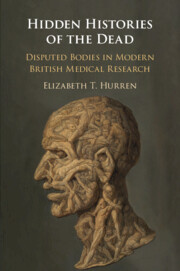Acknowledgements
This book has been written with the generous support of the Wellcome Trust in London, to whom I am very grateful for the financial funding they awarded to me in the past five years. I hope that the new research it contains is a fitting tribute to the extraordinary legacy and personal vision of Sir Henry Wellcome. He sought during his lifetime to engage the curiosity of the public with the fascinating hidden histories of the body in the twentieth century, and beyond. It thus contains wide-ranging new research material assembled as part of a major transdisciplinary, large Programme Grant: WT RA15G2019 on which I have been a Joint Principal Investigator, exploring ‘Disputed Bodies in Modern Medical Research’. In so many respects, what has been accumulated represents the culmination of over two decades’ archival research. This has meant that in two previous books, I have been able to explore the 1750 to 1830 as well as 1830 to 1930 phases of body supply in human anatomy. Now these are extended in this third monograph by exploring the neglected period of 1930 to 2000. This sort of historical perspective over the longue durée has never before been feasible in a history of the body in Britain. I am therefore very appreciative of all the kind assistance given to me by the dedicated staff working in county records offices, university libraries and national medical institutions, across the UK. Although they are too numerous to list here, I did want to pay a short tribute to their collective expertise. It remains remarkably open to enquiry, for it is admirable how they continue to maintain the highest professional standards against the backdrop of exceptional budget cutbacks in local government services and the heritage sectors. It therefore affords me enormous pleasure to be able to place this book once again on open access thanks to a Wellcome Trust publishing subvention. In so doing, I hope its contents will promote around the world the remarkable archival collections that are available to academics in Britain.
This book has also been written against the backdrop of far-reaching changes happening in the academic sector, many of which are undermining the foundation of scholarship. It has been thought-provoking to complete a trilogy of books and to contemplate that beyond REF2020 many fewer historians will have the same opportunities to publish high-quality outputs in the near future. I am therefore appreciative of those colleagues who have retained a commitment to collegiality in the face of the commercialisation of education, its mushrooming bureaucracies and a fees culture that encourages instrumentality amongst the student body. Having had a former career in finance for ten years and left it to embrace life-enhancing educational values, it is unsettling to find oneself back in such a profit-driven environment awash with management-speak of questionable value. Thankfully, academics continue to care and speak out about these worrying cultural trends. That they do so attests to one of the most engaging aspects of being a historian – the recognition that history is not just in our keeping, but in our making too. If this book, and those like it, can make a contribution to a larger conversation about the importance of high-quality research to shape our medical world for the next generation, then it will have succeeded in its central purpose.
At the same time, I continue to be inspired by the kindness of strangers. The hospitality that has been shared as I journeyed around Britain doing public engagement for this book has been a wonderful experience. I would in particular like to pay a short tribute to those hospices that opened their doors to my research enquiries. Inside I encountered patients, friends and families who spoke so movingly about end-of-life experiences. I unquestionably came away a different person from what I learned from those contemplating death. Hospices not only do remarkable work but have an ethos that is so life-enhancing. On a daily basis they defy clichés about them being either sad or scary places – they are the opposite. In their architecture, staffing and general facilities, I discovered light-filled places where people were making the most of life however limited their prognosis. It has been a privilege to be part of such a constructive, holistic and welcoming community. I discovered consensual medical ethics, practical support and dignified choices. Along the way, I also learnt afresh the central importance of regenerating the legacy of love. Thank you therefore to all those who peopled this book, many of whom are not named to protect patient confidentiality. I hope that in some small way that what is written reflects an extraordinary energy of purpose that was shaped by all those patients who spoke to me.
It is a fact of life that no academic book makes it out of the study without the loving support of friends and family. This book (like the others that precede it) reflects the delicious cooking and generosity of spirit of Professor Steven King. His commitment to the female principle is one, amongst a number, of his special character traits. For this book is ultimately about something he exudes – compassion. It is dedicated therefore to three special people who died in 2019 just as the revisions for this book were being finished. My uncle and godparent John Patterson spoke movingly to me, as did my hairdresser Sharron Tomlin and friend Lin Ross. They shared what compassion meant to them after their respective cancer diagnosis and painful treatments, and the pivotal role that it plays in all our lives wherever we experience medicine and the body in a global community. Thanks to them, Nunc scio quid sit amor – Virgil Eclogues, VIII.

